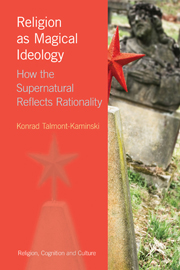5 - Religion as magical ideology
Summary
We have now seen in outline what it takes to provide a general explanation of magical beliefs and practices in terms of cognitive by-products and their interactions with cultural processes. The first element of that explanation was an account of reason that allowed us to understand why people's cognitive systems are subject to by-products in the first place. Subsequently, we examined the epistemic conditions necessary to allow the content of supernatural beliefs to be determined by those by-products rather than by empirical considerations. This required spelling out the various ways in which beliefs can be protected against potentially destabilizing counter-evidence. With those preliminaries behind us, we were in the position to sketch out how magical beliefs and practices are formed and stabilized. The postulated starting point of the process was illusory causal connections produced by a cognitive system that is biased to identify potentially useful regularities. These are married with psychologically convincing supernatural explanations and are maintained in a culture, at least in part, thanks to the indirect evidence provided by CREDs (i.e. the magical practices those beliefs are connected to).
The difference between religion and magic has thus far been drawn in terms of the epistemic status of the purported effects of religious versus magical practices. While this works well with the cognitive by-product explanation of religion, it ignores the work done by David Sloan Wilson and Richard Sosis, among others, which attempts to explain religion in terms of pro-social function.
- Type
- Chapter
- Information
- Religion as Magical IdeologyHow the Supernatural Reflects Rationality, pp. 97 - 122Publisher: Acumen PublishingPrint publication year: 2013



